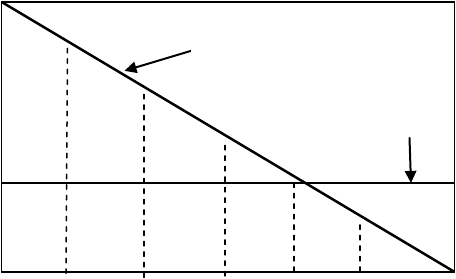Sample Test: Economics
1. Which term is used to describe the study of how people make decisions in a world where
resources are limited?
a. scarcity
b. decision-making modeling
c. economics
d. cost-benefit analysis
2. According to economic theory, when does scarcity occur?
a. when a society has more resources than it needs to produce goods and services
b. when there are not enough resources to produce all of the things a society would
like to have
c. when inflation occurs and demand for goods and services decreases
d. when inflation occurs and demand for goods and services increases
3. When deciding between renovating a water treatment plant or building a new community
pool, what is the government most likely to consider?
a. scarcity vs. resources
b. wages vs. prices
c. wants vs. needs
d. consumers vs. producers
4. What term do economists use to describe the alternative you face if you decide to do one
thing instead of another?
a. trade-off
b. marginal cost
c. marginal benefit
d. measure of cost
5. Which of the following best describes an opportunity cost?
a. the additional cost of producing one additional unit of output
b. an individual goes to the movies and decides to buy popcorn
c. the real price of items increases as the value of money decreases
d. an individual pays for a guitar lesson instead of going to the movies

6. Of the following scenarios, which is an example of immediate gratification?
a. an individual spends $100 on a pair of shoes instead of putting that money into his
saving account
b. an individual puts money into his savings account to use to buy a car when he
turns 16
c. an individual pays for a gym membership instead of going to the movies
d. an individual signs up for a credit card in order to begin building credit
Use the following graph to answer questions 7-8
5 10 15 20 25
Acres
7. Which of the following is represented by the graph?
a. supply-demand analysis
b. utility curve
c. opportunity cost analysis
d. cost-benefit analysis
8. Suppose the graph above shows the marginal benefits and costs for a farmer trying to
decide how much of her 25 acres to plant with lettuce. At what point should the farmer
stop farming more acres?
a. At 5 acres
b. At 15 acres
c. At 20 acres
d. At 25 acres
Marginal
Benefits
Marginal
Costs
9. An MP3 player manufacturer pays the same amount to produce each MP3 player no
matter how many it produces in total. Which term describes the type of cost for
producing MP3 players?
a. total cost
b. variable cost
c. fixed cost
d. marginal cost
10. A car manufacturer can produce 5 cars for $10,000 each. After 5 cars are produced, the
price to produce each additional car decreases to $7,500. Which term describes the type
of cost for producing cars?
a. total cost
b. variable cost
c. fixed cost
d. marginal cost
11. Which of the following is the best example of a fixed cost?
a. a monthly car payment
b. a credit card payment
c. a payment on an adjustable rate mortgage
d. the price of a new DVD
12. Which of the following terms refers to the extra or additional cost of producing one
additional unit of output?
a. total cost
b. variable cost
c. fixed cost
d. marginal cost
13. Which of the following is a market economy primarily based on?
a. capitalism and free enterprise
b. traditionalism and command
c. incentives and traditionalism
d. informed judgment
14. Which term would economists use to describe a low initial interest rate on a credit card?
a. obligation
b. incentive
c. voluntary exchange
d. marginal benefit
15. Which of the following best defines informed judgment?
a. choosing the next best alternative when choosing to do one thing rather than
another
b. the attitudes that most people hold about the relationship between the government
and the economy
c. choosing an alternative that has the greatest value from among comparable
products
d. choosing to limit the amount of goods produced in order to increase prices
16. What are the factors of production?
a. natural resources, labor, capital, and money
b. natural resources, capital, goods, and services
c. natural resources, labor, capital, and entrepreneurs
d. natural resources, money, labor, and entrepreneurs
17. Which of the following is an example of a capital good?
a. a box of cereal
b. a pair of shoes
c. a television
d. a hammer
18. Which of the following best defines Gross Domestic Product (GDP)?
a. the total value of any goods and services produced in a single year
b. the total value of all final goods and services produced in a single year
c. the total value of all capital good and services produced in a single year
d. the total value of all labor produced in a single year
19. Capitalism thrives on competition. What is the main benefit of competition?
a. lower prices
b. better decision making
c. a successful democracy
d. marginal costs and benefits
20. What are the major characteristics of capitalism?
a. competition, profit, and government ownership of resources
b. government set prices and private property
c. competition, profit, and production based on custom and tradition
d. markets, private property, competition, and profits
21. Who wrote the book Wealth of Nations, which provides the basic philosophy for the
capitalist system?
a. Karl Marx
b. Milton Friedman
c. Adam Smith
d. John Keynes
22. Which term describes the money left over after all costs of production have been paid?
a. revenue
b. marginal expense
c. profit
d. loss
Answer Key
1. C
2. B
3. C
4. A
5. D
6. A
7. D
8. C
9. C
10. B
11. A
12. D
13. A
14. B
15. C
16. C
17. D
18. B
19. A
20. D
21. C
22. C
